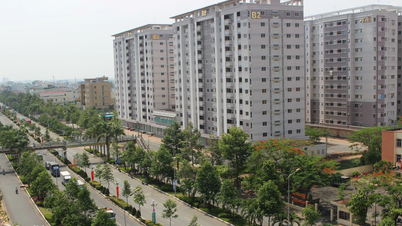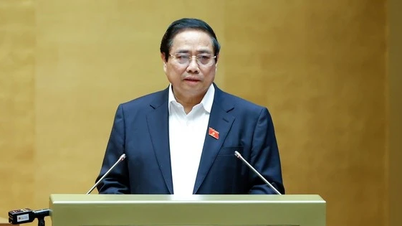Mr. Pham Tan Cong, Chairman of Vietnam Federation of Commerce and Industry (VCCI):
Actively promote the role of bridge in implementing the Resolution

After nearly 40 years of renovation, the private economy has gradually developed strongly, both in quantity and quality. This sector currently has more than 940,000 enterprises and more than 5 million business households in operation, contributing about 50% of GDP, more than 30% of total state budget revenue and employing about 80% of the total workforce, contributing to economic growth in the area.
The private economy is an important resource to promote innovation, improve labor productivity, increase national competitiveness, contribute to poverty reduction, and stabilize social life in Vietnam. Many private companies have grown strongly, affirmed their brands, and reached out to regional and world markets.
Resolution No. 68-NQ/TU has recognized and placed the position and role of the private economy as the most important driving force of the economy. Along with that, the state economy continues to play a leading role. This is an acknowledgement and inspiration for businesses and entrepreneurs. At the same time, many support mechanisms have been introduced to create favorable conditions for the development of the private economic sector with very strong reforms from the business environment, mechanisms to create capital, mobilize resources and then develop human resources for businesses.
Resolution No. 68-NQ/TU can be said to be a "road-clearing" order for the private economic sector, but to promote real effectiveness for businesses and entrepreneurs, the important thing is the implementation and institutionalization of the resolution into life. This is a very difficult step and depends on the strong participation of the entire political system as well as the awareness of each cadre in the process of implementing the resolution.
In that context, the role of organizations and business associations such as VCCI is very important. VCCI will be the bridge between the Party, the State and the business community. Activities such as improving the Provincial Competitiveness Index (PCI), providing the business community's perspectives on the quality of economic management of localities will continue to be implemented by VCCI, contributing to improving the business environment.
In the coming time, VCCI and business associations will promote their role as a bridge between enterprises and functional agencies, actively reflect the opinions of entrepreneurs and enterprises in implementing Resolution No. 68-NQ/TU, determined to bring Resolution No. 68-NQ/TU into life through listening to the opinions of people and enterprises. From there, opinions will be synthesized to make recommendations to the Party and Government to promptly adjust and effectively organize the implementation of Resolution No. 68-NQ/TU.
Dr. Nguyen Thi Cam Giang, Faculty of Finance, Banking Academy:
Minimize business regulations

Resolution No. 68-NQ/TU dated May 4, 2025 of the Politburo marks an important turning point in awareness and action to develop the private economic sector into "one of the most important driving forces of a self-reliant and sustainable economy". With the goal of having 2 million enterprises by 2030, the private sector contributing 55-58% of GDP and 84-85% of total employment, the Resolution demonstrates a strong determination to create a favorable, fair and transparent development environment for the private sector. However, to realize this aspiration, specific and synchronous actions are needed from both the State and the business community.
First of all, on the State side, the most important solution is to perfect the institutions and legal framework to ensure freedom of business and equal access to resources. Amendments to relevant laws such as the Enterprise Law, Investment Law, Competition Law, etc. need to be urgently implemented in a transparent manner, removing legal barriers, reducing compliance costs and ensuring legal security for businesses. In addition, the Government needs to continue to promote administrative procedure reform, minimize business regulations and promote digital transformation in data management, reducing administrative intervention in private economic activities.
In particular, tax and credit policies need to support and encourage start-up, innovation and creativity activities. Tax exemption for the first three years for new enterprises, reduction of corporate income tax for small and medium enterprises, allowing research and development costs to be deducted when calculating taxes, etc. are steps that need to be clearly and consistently institutionalized. At the same time, local governments need to proactively issue their own action programs and special mechanisms, suitable to practical conditions, support businesses in their management areas through investment promotion and support centers for start-up innovation, and connect businesses with credit programs.
On the business side, proactiveness and innovation in management thinking are decisive factors. Businesses need to actively participate in the digital transformation process, improve labor productivity, and focus on investing in technology, brands, and human resources. Cooperation in chains and forming industry clusters are also inevitable directions to increase competitiveness and expand development scale.
In the context of Vietnam moving towards a sustainable growth model, the private economic sector is identified not only as a productive force, but also as an agent of innovation, accompanying the State in creation and service. Resolution No. 68-NQ/TU is a call to action, but success will only come if the State acts decisively, and businesses are ready to break through with a spirit of self-reliance and aspiration to rise up.
Mr. Pham Dinh Ngai, General Director and Founder of Tra Vinh Farm Company Limited (Sokfarm):
Enterprises need to proactively build development strategies to compete fairly.

Resolution No. 68-NQ/TU has aroused national pride among entrepreneurs. Changing mindsets and perceptions will help private enterprises like us have favorable conditions to develop. With new opportunities from policies, the responsibilities of private enterprises are also becoming clearer. That is to concretize policies on accessing resources, promoting innovation, strengthening the connection between private enterprises and foreign enterprises, state-owned enterprises, etc.
When there is a connection, economic blocs will benefit from scientific and technological advances, share resources, and even become part of the global supply chain, supporting each other to develop together. It can be seen that more than 82% of workers work in the private sector, while 70% of small and medium enterprises still have to rely on mortgaged assets to borrow capital.
Therefore, the removal of barriers to land, credit, data and high-quality human resources is the greatest expectation of our business community. If the commitments of "transparency, low cost, and international standards" are legalized in the period of 2025-2028, businesses will save significantly on time and compliance costs.
However, when institutional reform is open, the level of competition is higher and fiercer, any enterprise that does not proactively innovate, create, do business... is much more likely to be eliminated. Therefore, each enterprise needs to proactively build a strategy to change products, business models, and management skills to be ready to compete in the context of changing management thinking to help enterprises compete equally and fairly.
Mr. Chu Thanh Tuyen, Secretary of Party Cell of Residential Group 17, Xuan La Ward, Tay Ho District:
The Party's "Strategic Quartet" will develop the private sector
.jpg)
On the morning of May 18, all cadres, party members and people of Xuan La ward followed the entire content of the dissemination conference organized by the Central Committee. We were especially pleased with the comments of General Secretary To Lam, affirming that 4 important resolutions, including: Resolution No. 68-NQ/TU, Resolution No. 66-NQ/TU, Resolution No. 57-NQ/TU and Resolution No. 59-NQ/TU are the "Quadruple Pillar Strategies" to help our country "take off" and develop strongly in the new era of national development.
In particular, at this conference, businesses directly reflected their thoughts, aspirations, and proposed problems and difficulties, which were immediately answered by the Prime Minister. This is a very new point, contributing to further strengthening the business community's trust in the Government's reform commitments.
I believe that, with strong innovation policies and comprehensive support from the Government, the private economic sector will develop remarkably, creating new momentum for economic growth when barriers are gradually removed.
Right after the conference ended, I met with private enterprises in Xuan La ward. Although these are small-scale cooperatives operating in the field of tea production, the enterprises were very excited about the Government's commitments and expressed their confidence in the strong innovative viewpoints that the Government will implement in practice. These are very encouraging signs, because a policy when put into practice and receiving the consensus and support of the masses will bring practical results, contributing to the development of the capital and the country in the new era.
Source: https://hanoimoi.vn/hanh-dong-sau-lenh-mo-duong-702656.html


![[Photo] Ready for the top competitions of Vietnamese table tennis](https://vphoto.vietnam.vn/thumb/1200x675/vietnam/resource/IMAGE/2025/5/18/9c547c497c5a4ade8f98c8e7d44f5a41)
![[Photo] Party and State leaders attend the special art program "You are Ho Chi Minh"](https://vphoto.vietnam.vn/thumb/1200x675/vietnam/resource/IMAGE/2025/5/18/6895913f94fd4c51aa4564ab14c3f250)
![[Photo] Many young people patiently lined up under the hot sun to receive a special supplement from Nhan Dan Newspaper.](https://vphoto.vietnam.vn/thumb/1200x675/vietnam/resource/IMAGE/2025/5/18/6f19d322f9364f0ebb6fbfe9377842d3)





















































































Comment (0)